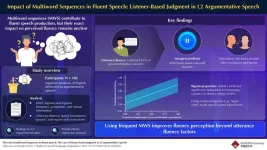(Press-News.org)
Language learners often assume that using rare, complex vocabulary will make their speech sound more fluent. Research suggests that there is a close relationship between formulaic expression usage in speech and acoustic features of oral fluency. This implies that using formulaic expressions leads to faster articulation speed and fewer disruptions during speech. However, in terms of how listeners perceive speakers’ fluency, the role of formulaic expressions has been unclear.
To investigate this, Ph.D. student, Kotaro Takizawa and Research Assistant Professor Shungo Suzuki from Waseda University, Japan, analyzed speech from 102 Japanese speakers of English, each delivering an argumentative speech. They measured the use of bigram and trigram expressions (two- and three-word sequences) and had fluency judged by 10 experienced raters. The study controlled for key fluency metrics, including articulation rate, pauses, and self-corrections, to isolate the effect of formulaic expressions on fluency perception. This study was published online in the journal Studies in Second Language Acquisition on February 12, 2025.
The findings revealed that utterance fluency (smoothness of speech delivery) was the strongest predictor of fluency perception, accounting for 61% of the variance in ratings. However, high-frequency formulaic expressions added an extra 0.8% to fluency judgments, while rarer, more complex phrases had little to no effect.
The study also reveals that the key to sounding fluent is not about using sophisticated words; it is about using the right phrases. Their study shows that common, everyday expressions have a small but significant impact on how fluency is perceived, even when a factor like smoothness is accounted for. "We found that common, oft-used formulaic expressions, rather than rare, sophisticated ones, significantly influenced rater judgment of speakers’ fluency," said Takizawa.
Fluency plays a crucial role in language learning and assessment, especially in standardized tests like TOEFL and IELTS, where expert raters evaluate how natural and smooth a speaker sounds. Traditionally, fluency has been associated with speed and uninterrupted speech, but the role of formulaic expressions (common multi-word phrases) has been less clear. Previous studies suggested that these expressions help speakers communicate more smoothly, but few have examined how they influence fluency perception on their own.
Suzuki highlighted the practical implications: "It is generally observed that language teachers and learners tend to focus more on rare words or difficult phrases that sound more proficient. However, the current findings indicate that that should not necessarily be the focus, particularly if they want to improve their fluency perceived by others."
This research suggests that learners should shift their focus from advanced vocabulary to mastering everyday phrases that come naturally in conversation. For example, instead of saying "I agree the idea"—which sounds unnatural—learners should use "I agree with the idea." These common expressions are easy to find in textbooks and everyday conversations, making them more accessible for learners of all levels.
The study has significant implications for language testing, where fluency judgments can impact scores. It suggests that test-takers should focus on integrating natural phrasal expressions into their speech while maintaining the smoothness of their speech. Highlighting the importance of both aspects, "Our research shows that there is no denying that improving fluency in utterance contributes to good fluency judgment scores," noted Takizawa.
This study highlights the crucial role of common expressions in shaping how fluency is perceived, offering valuable insights for language learners and educators.
***
Reference
DOI: https://doi.org/10.1017/S0272263125000051
Authors: Kotaro Takizawa1, Shungo Suzuki2
Affiliations
1Graduate School of Education, Waseda University, Japan
2Green Computing Systems Research Organization, Waseda University, Japan
About Waseda University
Located in the heart of Tokyo, Waseda University is a leading private research university that has long been dedicated to academic excellence, innovative research, and civic engagement at both the local and global levels since 1882. The University has produced many changemakers in its history, including nine prime ministers and many leaders in business, science and technology, literature, sports, and film. Waseda has strong collaborations with overseas research institutions and is committed to advancing cutting-edge research and developing leaders who can contribute to the resolution of complex, global social issues. The University has set a target of achieving a zero-carbon campus by 2032, in line with the Sustainable Development Goals (SDGs) adopted by the United Nations in 2015.
To learn more about Waseda University, visit https://www.waseda.jp/top/en
About Kotaro Takizawa
Kotaro Takizawa is a Ph.D. student at Waseda University's Graduate School of Education. He earned his B.A. (2019) and M.A. (2021) in Education from the same institution. His research focuses on second language acquisition, particularly the relationship between oral fluency and formulaic language. Currently, he is a Research Fellow at the Japan Society for the Promotion of Science (2023–2025).
END
Directive 2010/63/EU laid down restrictions on animal testing for the testing of cosmetics and their ingredients throughout the EU. Therefore, there is an intense search for alternatives to test the absorption and toxicity of nanoparticles from cosmetics such as sun creams. A team of researchers from Graz University of Technology (TU Graz) and the Vellore Institute of Technology (VIT) in India is working on the development of skin imitations that mimic the native three-layer tissue structure and biomechanics of human skin. Such imitations can be produced ...
The first-of-its-kind in-depth bacterial evolutionary map could pave the way for the development of precision treatments for certain antibiotic-resistant infections, such as urinary tract infections.
Researchers at the Wellcome Sanger Institute, the University of Oslo, UiT The Arctic University of Norway, and their collaborators, have developed a new way of using large-scale long-read sequencing data to investigate circular genetic structures called plasmids in the most commonly studied microbe, Escherichia coli (E. coli). Through this, the team were able to track the flow ...
(Philadelphia, PA) – Neurodegenerative conditions such as Parkinson’s disease and Alzheimer’s involve progressive neuronal loss due to disease-induced damage. An enzyme known as dual leucine-zipper kinase (DLK) plays a key role in this process, telling neurons that are damaged or unhealthy when they should cut their losses and self-destruct. Hence, sparing neurons from DLK is an attractive therapeutic strategy that could slow disease progression.
Past attempts to inhibit DLK’s action in human patients, however, led to unexpected side effects affecting the nervous system, suggesting that DLK ...
A switch of just two weeks from a traditional African diet to a Western diet causes inflammation, reduces the immune response to pathogens, and activates processes associated with lifestyle diseases. Conversely, an African diet rich in vegetables, fiber, and fermented foods has positive effects. This study, published in Nature Medicine, highlights the significant impact of diet on the immune system and metabolism.
Lifestyle diseases such as cardiovascular diseases, diabetes, and chronic inflammatory conditions are surging across Africa, posing a growing challenge to healthcare systems throughout the continent. Increasing economic ...
By Shawn Ballard
Imagine a world where industrial waste isn’t just reduced, it’s turned into something useful. This kind of circular economy is already in the works for carbon. Now, researchers in energy, environmental & chemical engineering at Washington University in St. Louis have developed a promising pathway to convert harmful nitric oxide, a key component of acid rain, into valuable nitric acid, which is used in everyday applications from fertilizer production to metal processing.
Feng Jiao, the Lauren and Lee Fixel Distinguished Professor in the McKelvey School of Engineering at WashU, and collaborators developed a method ...
For patients with polycystic kidney disease (PKD), a common genetic disorder that ravages the waste-removing organ with cysts, dialysis and transplantation are among the only treatments.
More than 12.4 million people worldwide suffer from the dominant form of the condition. Now, Rutgers University geneticists have uncovered fresh details of how the disease progresses – findings that could open the door to new therapies.
In a study published in Nature Communications, Inna Nikonorova, a research assistant professor in the Department of Genetics within the Rutgers School of Arts and Sciences, reports on a novel way to identify and track material carried ...
A new study, published today in Nature Chemistry by researchers from the University of Pittsburgh and Yale University, shows how common gut bacteria can metabolize certain oral medications that target cellular receptors called GPCRs, potentially rendering these important drugs less effective.
Drugs that act on GPCRs, or G protein-coupled receptors, include more than 400 medications approved by the U.S. Food and Drug Administration (FDA) for treatment of many common conditions such as migraines, depression, type 2 diabetes, prostate cancer and more.
“Understanding how GPCR-targeted drugs interact with human gut microbiota is critical for advancing ...
Birmingham scientists have shown that a sequence of just three amino acids may reduce the severity of psoriasis, when applied topically in an emollient cream.
The researchers, whose study is published in Pharmacological Research, identified the smallest part of a peptide (small protein) called PEPITEM, which occurs naturally in the body and regulates inflammation.
The study also showed that both PEPITEM and the three amino acid (tripeptide) sequence delivered a significant reduction in the severity of psoriasis, that is comparable to a steroid cream.
Psoriasis ...
A new study has found that young vapers in the United States who begin using e-cigarettes after graduating from secondary/high school are likely to progress rapidly to frequent use. While US youths who start vaping during secondary/high school typically take about three years to progress to frequent use, this newly identified group of young adults who start vaping a bit later, after graduation (mean age = 20 years), tend to reach frequent use in about one year. ‘Frequent use’ is defined as using e-cigarettes on 20 or ...
Commonly called the “corpse flower,” Amorphophallus titanum is endangered for many reasons, including habitat destruction, climate change and encroachment from invasive species.
Now, plant biologists from Northwestern University and the Chicago Botanic Garden have added a new threat to the list: incomplete historical records.
In a new study, scientists constructed the ancestry of corpse flowers living in collections at institutions and gardens around the world. They found a severe lack of consistent, standardized data. Without complete historical records, conservationists were unable to make informed decisions ...



